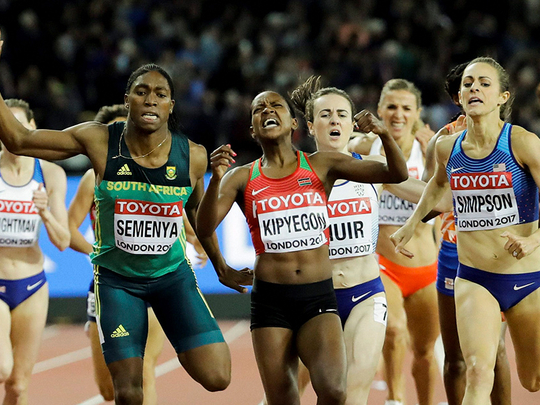
London: South African Caster Semenya, dogged by gender accusations since shooting to fame in 2009, has played down efforts by track and field’s governing body to change rules on naturally occurring testosterone in female athletes.
Semenya is back in the spotlight following a study funded by the IAAF and the World Anti-Doping Agency (WADA) that showed female athletes with naturally high levels of testosterone enjoy a competitive advantage of up to 4.5 per cent over their rivals.
The 26-year-old South African, double defending Olympic 800m champion and also a two-time world gold medallist in the distance, was one of a number of women taking medication to lower her testosterone level until 2015 when the Court of Arbitration for Sport (CAS) suspended an IAAF rule that enforced a limit on naturally occurring levels.
Semenya has studiously avoided the controversy, instead concentrating on her track performances and she won a bronze in the highly competitive 1,500m at the world champs in London on Monday.
“Those are the things, the issues, that I don’t focus on. It’s not my business. It’s their business,” Semenya insisted.
“Those are the writings that I’ve being seeing since 2009,” she said of a particularly unsavoury moment in her career after winning gold in the Berlin worlds in 2009.
Questions were asked of her sex after that storming victory preceded by an incredible athletic progression, and she ended up spending 11 months on the sidelines when the IAAF conducted that verification process.
“Sometimes, you get annoyed or you get bored,” she said of the saga that has raised its head once again, insisting it was not her problem.
“For me, it’s the past. Whoever deals with it, it’s their business, not mine.
“I’m not even bothered.
“I’m the kind of person who doesn’t really focus on more negativity. I’m a positive person and I look at things in a positive way.
“Obviously, as a human — you understand? — you get to a point where you just focus on you.
“I don’t work for the IAAF. I’m Caster Semenya. I’m an athlete. I focus more on my future.
“For me, they do their job. I do my job.
“I have no problem with such things.
“Such situations are just a waste of time for me.”
When asked whether she would comply if the IAAF ruled that she once again take medication to lower her testosterone levels, Semenya said: “I’ve no time for nonsense. Medication or no medication.
“For me, it’s their own decisions.
“I really don’t have time for nonsense.”
After winning 1,500m bronze behind Kenyan winner Faith Kipyegon and silver medallist Jennifer Simpson of the United States, Semenya will focus on her preferred 800m, no doubt readying herself for a fresh bout of questioning.











